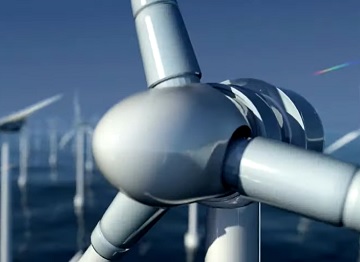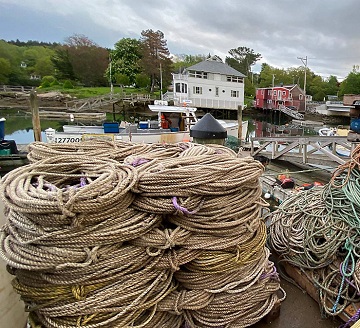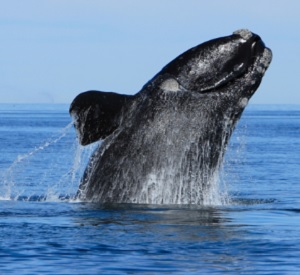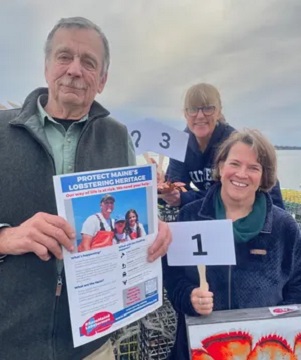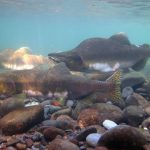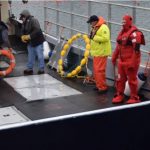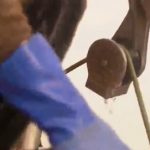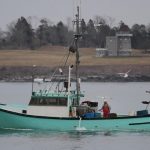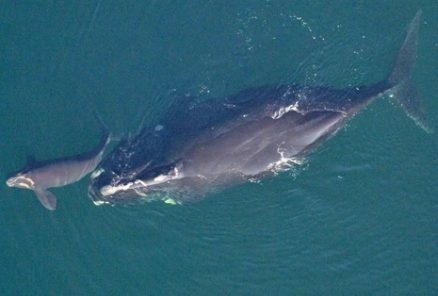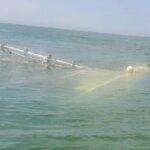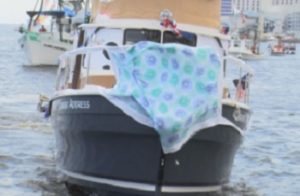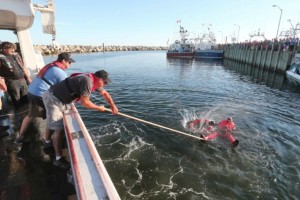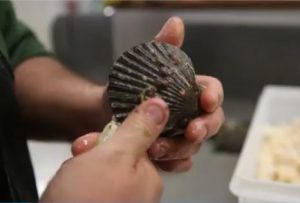Tag Archives: North Atlantic right whale

Right whale’s decline worse than previously thought, feds say
The North Atlantic right whale numbers less than 350, and it has been declining in population for several years. The federal government declared the whale’s decline an “unusual mortality event,” which means an unexpected and significant die-off, in 2017. The National Oceanic and Atmospheric Administration released new data that 114 of the whales have been documented as dead, seriously injured or sub-lethally injured or sick since the start of the mortality event. That is an increase of 16 whales since the previous estimate released earlier this year. The agency recently completed a review of the whales using photographs from researchers and surveys to create the new estimate, said Andrea Gomez, a spokesperson for NOAA. >click to read< 17:51
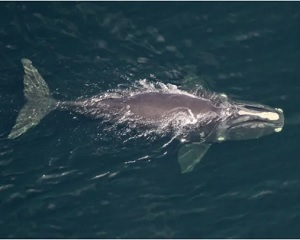
Entangled North Atlantic right whale spotted in Gulf of St. Lawrence
A North Atlantic right whale has been spotted entangled in the Gulf of St. Lawrence, near Lamèque in northeastern New Brunswick. A research vessel saw the whale, a 13-year-old male known as EG No. 4042, east of Lamèque and northwest of Prince Edward Island, on Saturday, Fisheries and Oceans Canada announced Monday. He appears to be carrying a “long trailing line, with no visible buoys,” according to a news release. Groups who respond to marine mammals in distress planned to attempt to disentangle the whale on Sunday morning but couldn’t because of the weather. >click to read< 13:47
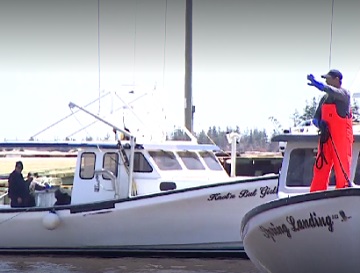
Expect more temporary closures of P.E.I. lobster fishery, DFO says
Future in-season closures of the P.E.I. lobster fishery are not out of the question as more endangered right whales are spotted in shallow waters, says Fisheries and Oceans Canada. A portion of Lobster Fishing Area 24 was shut down in May after two right whales were spotted off P.E.I.’s north shore. It was the first time DFO had to close off that part of the area due to a whale sighting, and it meant lobster crews had to move their traps to shallower waters. It’s likely not the last time it will happen, said Brett Gilchrist, DFO’s director of national programs. Video, >click to read< 15:25
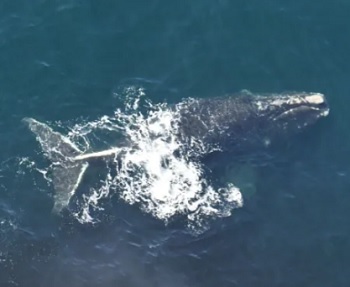
Whale detection shuts down major portion of Cape Breton snow crab fishery
The detection of an endangered North Atlantic right whale in the Gulf of St. Lawrence has forced the temporary closure of a major portion of the snow crab fishery off western Cape Breton. It comes just days after the season opened. The whale was detected by an acoustic sensor. Fishermen have until 5 p.m. Monday to move their gear out of a large closure zone. Many had just dropped their pots. The closure is set for 15 days. The Department of Fisheries and Oceans posted a notice of the closure to harvesters on Friday. It affects about 140 licence holders in what is known as Crab Fishing Area 19. >click to read< 17:22
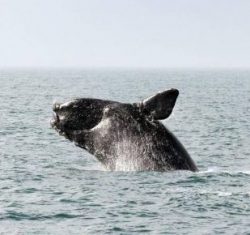
Rep. Carter introduces bill to prevent NOAA from implementing speed rule
U.S. Rep. Buddy Carter, R-1, is defending a bill he introduced Friday that would prohibit a federal agency from requiring more vessels to adhere to a low speed when approaching the East Coast during certain months of the year. House Bill 4323 calls for prohibiting the issuance of an interim or final rule that amends, updates, modifies or replaces the North Atlantic Right Whale Vessel Strike Reduction Rule until mitigation protocols are fully developed and deployed. If passed, the U.S. Department of Commerce, the parent agency of NOAA, would be required to develop and deploy technology to monitor Atlantic waters for right whales. >click to read< 07:53

Federal appeals court sides with lobstermen in whale protection case anchored off New England
A federal appeals court has sided with commercial fishermen who say proposed restrictions aimed at saving a vanishing species of whale could put them out of business. The fishermen and the state of Maine appealed their case to the U.S. Court of Appeals for the District of Columbia Circuit after losing in a lower court. The appeals court said Friday it disagreed with the lower court’s ruling. Maine Gov. Janet Mills, a Democrat, and other Maine politicians have sided with the fishermen, who feel the new fishing restrictions are based on flawed data and are overly punitive. The U.S. lobster fishing industry, worth hundreds of millions of dollars per year, is based largely in the state. “We’re facing rules that are just nonsensical,” said Dave Cousens, a lobster fishermen and past president of the Maine Lobstermen’s Association. “They don’t pass a straight-face test.” >click to read< 15:32

Rockland Council holds off on resolve that supports lobster industry, dismisses right whale concerns
The City Council voted Monday evening, June 12, to postpone for two months a resolve to support the lobster industry out of concern that the language goes too far in dismissing concerns about the impact on the endangered right whale. Councilor Austin was unsuccessful in removing some of the language from the resolve concerning right whales. That vote was 3-2 against removing the language with the mayor supporting Austin’s effort. The statements at issue in the resolve were ones that dismissed the concerns that environmentalists have about the lobster industry’s impact on right whales. >click to read< 08:02
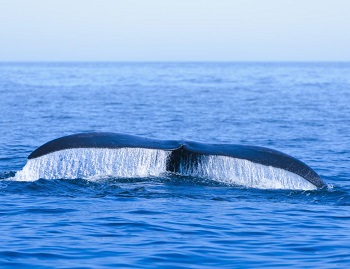
Fishing area closed after North Atlantic right whale sighting set to reopen this week
A lucrative lobster fishing area in the Maritimes is set to reopen this week after a sighting of North Atlantic right whales shuttered the fishery just weeks into the spring season. The endangered whales were spotted earlier this month in the Gulf of St. Lawrence, northeast of Prince Edward Island’s Malpeque and Cascumpec Bays. The sighting triggered a 15-day closure of popular lobster fishing grounds — part of Lobster Fishing Area 24. The federal Fisheries Department says the fishing area is set to reopen Friday. But it says two surveillance flights are required before the area reopens to fish harvesters to determine whether whales are still present. >click to read< 13:32
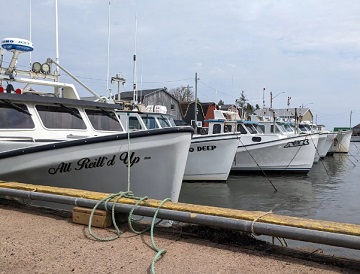
‘Aggravation’ expected when part of lobster fishing area closes
Chris Wall is among those being asked by the Department of Fisheries and Oceans to remove all their gear from a portion of lobster fishing area 24 before it closes on Tuesday at 5 p.m. due to the confirmed sighting of a North Atlantic right whale. “It will affect the bottom line because I think you’re going to find more people in a smaller area trying to catch the same amount of lobsters,” Wall said. “So … it will affect everybody. It’s just going to cause some aggravation, for sure.” Wall isn’t aware of any right whale ever getting caught in lobster fishing gear on P.E.I., he said. >click to read< 08:56
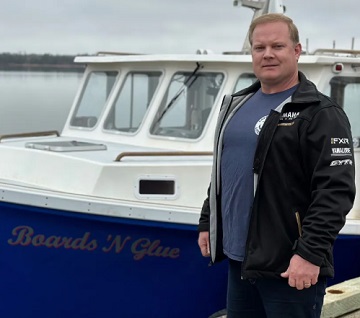
Right whale sighting shuts down lobster fishing section for at least 15 days
The Department of Fisheries and Oceans is asking lobster fishers to remove all gear in a portion of Lobster Fishing Area 24 within the next 96 hours due to the confirmed sighting of a North Atlantic right whale. The whale was at the 10 and 20 fathom line in LFA 24 off the Island’s northern coast, the P.E.I. Fishermen’s Association said in a release. Charlie McGeoghegan, chair of the P.E.I. Lobster Marketing Board, said the early closure is “very disappointing.” “It’s the heart of our season.” >click to read< 11:36

Maine: Fishing industry forum May 24
Our way of life up and down the Maine coast is under attack. Families that have made their living in the lobster industry for generations are on the road to extinction. If the federal government has their way, pending regulations will force the lobster industry out of business and the Gulf of Maine will be reserved for offshore wind. The Lincoln County Republicans are hosting an event on May 24 where the public can hear, firsthand, from three prominent men in the Maine fishing industry – Representative Billy Bob Faulkingham, Dustin Delano and Jason Joyce. The event will be held at Coastal Christian School, 574 N. Nobleboro Road, Waldoboro. Doors open at 5:30 p.m. >click to read< 15:52
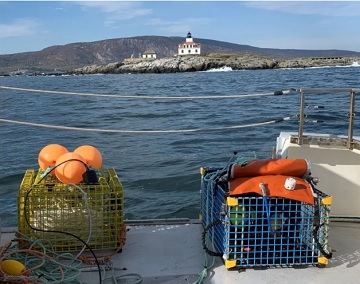
Hope vs. rope: Can technology save the whales, and Maine’s lobster industry, too?
Along the coasts of Massachusetts and Rhode Island, scientists, engineers, and fishermen are working feverishly to develop a new, high-tech way to harvest lobster – and the result could be the key to the survival of both the U.S. lobster fishery and the imperiled North Atlantic right whale. But farther north in Maine, the epicenter of the fishery, it’s unusually quiet. Only one Maine business is working on the technology, and only a handful of Maine lobstermen will test it. Many won’t even discuss it. The ropeless part is being worked out, but another critical component – an interoperable, open platform to track gear – is far from ready. The new equipment also is, at least for now, prohibitively expensive. One lobsterman said it would cost him nearly $500,000 upfront. >click to read< 16:20
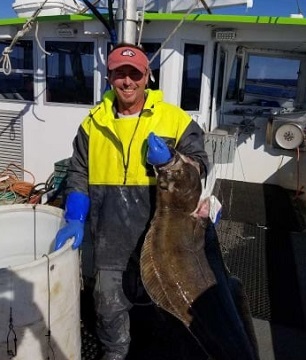
‘Enough is enough’: Midcoast lobsterman decries regulations to protect whales
Jason Lord, a second-generation Midcoast said he understands the effort to save critically endangered North Atlantic right whales. The problem, he contends, is lawmakers, government agencies and conservation groups have it wrong by targeting the Maine lobster industry, which has been forced to use breakaway trap lines and observe a seasonal no-fishing zone to protect the whales. “I’ve never seen a right whale off the coast of Maine,” said Lord, 50, who has been in the industry for 30 years. An Arizona congressman recently proposed a bill that could lead to further regulations like ropeless lobster traps. Last week, Maine Lobstering Union Local 207 Executive Liaison and Political Director Virginia Olsen testified against the bill on Capitol Hill. >click to read< 18:23
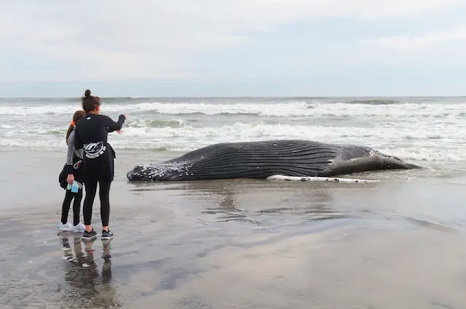
‘License To Kill’ Whales, Dolphins Handed to Offshore Wind Power Companies in Biden’s Green Energy Push
Greenpeace launched its “Save the Whales” campaign on April 27, 1975. But in the ensuing years, Greenpeace has gone full Orwell. Greenpeace is no longer interested in saving the whales. It may actually be aiding and abetting the Biden administration and the offshore wind industry in killing whales supposedly to “save the planet.” The deaths are coincident, however, with an increase in activity by the offshore wind industry as it surveys locations to erect its turbines. As it turns out, the federal agency has actually issued permits to the offshore wind industry to kill whales, dolphins and even seals. And not just one or two members of the species. >click to read< 09:11

The Case: Defamation suit marks shift in fight over lobstering – MLA says Seafood Watch assessment intentionally misstates facts
A University of Maine Law School professor says it’s unlikely a judge or jury will actually settle the science around lobstering’s impact on North Atlantic right whale mortality in a recently filed defamation lawsuit against Seafood Watch and the Monterey Bay Aquarium Foundation. Instead, Dmitry Bam explained, the case—if it ever reaches trial—will probably turn on whether the aquarium’s seafood sustainability program was negligent or reckless about the evidence it actually used to claim that scientific data demonstrate that lobstering harms the endangered whale species. Last fall, Seafood Watch put American lobsters on its red list of foods to avoid because it “is caught or farmed in ways that have a high risk of causing harm to wildlife or the environment.” >click to read< 11:45
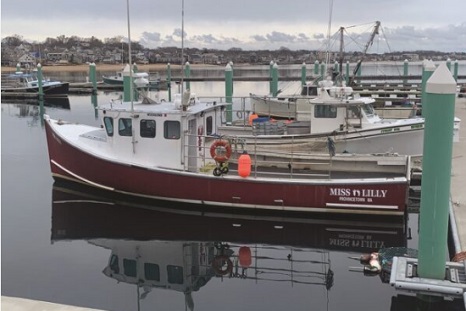
On Demand Gear – Cape Cod Lobstermen Would Rather Wait Than Switch
21-year-old North Atlantic right whale known as Porcia was observed in Cape Cod Bay on March 18. The whale was seen swimming with her 2023 calf by her side. That means Cape Cod lobstermen are on land, waiting out the whales. Elsewhere in Massachusetts waters, however, the NOAA is running an experiment that gives lobster fishermen exempted fishing permits to work in areas that are otherwise restricted. What they are testing is something called on-demand fishing gear. “I think it’s a Star Wars idea that will not work,” said Dana Pazolt, a Truro-based lobsterman who sets his traps on the bay side in the fall and on the ocean side in the spring and summer. Pazolt’s 800 lobster traps have 50 miles of rope. >click to read< 11:10
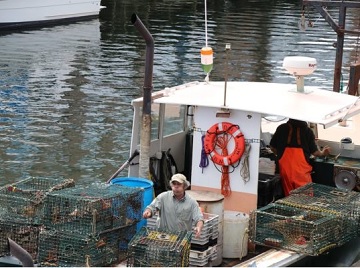
Faulkingham Pitches $1,000,000 State Contribution to Lobster Legal Defense Fund
A public hearing will be held Thursday to discuss a bill aimed at providing financial support to the Maine Lobstermen’s Association (MLA), a group that represents Maine’s lobster industry. The bill, proposed by House Minority Leader Billy Bob Faulkingham (R-Winter Harbor), would provide the MLA with a one-time contribution of $1,000,000 to offset large expenses the organization has incurred in recent years as it fights against burdensome federal regulations. Faulkingham expressed his concern for the Maine lobster industry, which he says is “under attack” and facing potentially devastating regulations and lawsuits. >click to read< 08:57
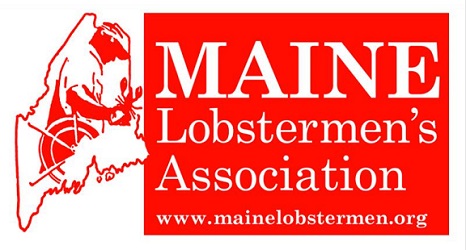
Maine Lobster Fishery Sues Monterey Bay Aquarium, Claims Attack on Maine Lobster Fishing Practices Is Defamatory
Maine lobster businesses and industry trade associations today filed a federal lawsuit against the Monterey Bay Aquarium Foundation (the “Aquarium”) for making false and defamatory statements about Maine lobster fishing practices and for misleading consumers and commercial lobster buyers about the integrity of the Maine lobster harvest. The lawsuit challenges the Aquarium’s claims that “scientific data” show that Maine lobster fishing practices are responsible for harming North Atlantic right whales. The lawsuit asserts that the Aquarium’s claims are in fact not supported by science, and that the Aquarium’s false statements have caused substantial economic harm to plaintiffs, as well as to the Maine lobster brand and to Maine’s long-standing reputation for a pristine coastal environment protected by a multi-generational tradition of preserving resources for the future. Plaintiffs include Bean Maine Lobster Inc., the Maine Lobstermen’s Association (MLA), the Maine Coast Fishermen’s Association, Atwood Lobster LLC, and Bug Catcher Inc., owned by sixth-generation fisherman Gerry Cushman of Port Clyde. To continue, >click to read< 12:57
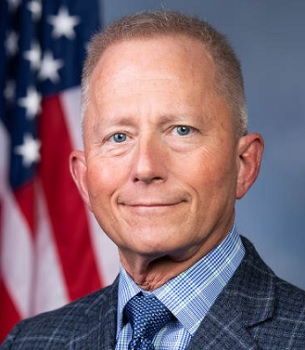
Fed Official: Offshore Wind Will Adversely Impact North Atlantic Right Whale
Ahead of his March 16 hearing on offshore wind at the Wildwood Convention Center, Congressman Jeff Van Drew is challenging the federal government and offshore wind companies to prove they have nothing to hide when it comes to negatively impacting the environment. “Hearings are critical,” he said in a statement released last week condemning President Joe Biden’s administration for “its continual lack of transparency with the American people – this time about the correlation of offshore wind development and the death of endangered whales.” Van Drew’s latest comments follow the release of a May 13, 2022 missive from Sean Hayes, chief of protected species for NOAA’s National Marine Fisheries Service. In the letter to Brian Hooker, lead biologist for Bureau of Ocean Energy Management, Office of Renewable Energy Programs, Hayes laid out how offshore wind development in New England would negatively affect the North Atlantic right whale. >click to read< 08:04
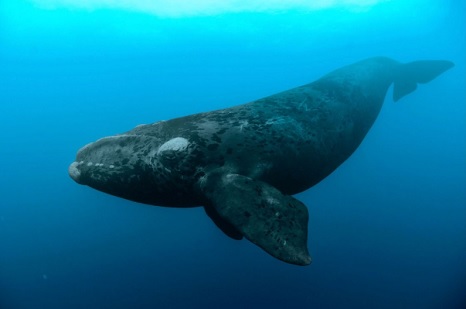
The Whale slaughter continues, but is this just the beginning? By Jim Lovgren
Another Humpback Whale washed ashore on a New Jersey beach on March 1st , the 12th known Whale to die since the start of December, along the New York, New Jersey shoreline, coincident with multiple research vessels using active Sonar, seismic Pingers, and Ultra High Resolution Seismic sparkers. As more research vessels ply our waters, more dead Whales wash up on the beach. This is just the start of the gigantic ecosystem changing industrialization of the US continental shelf from the Gulf of Maine to Florida. We now have 23 dead Whales on the east coast within a three month period, and despite what government officials claim, it is not a normal amount. >click to read< 07:55
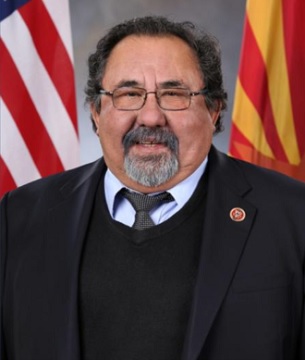
Maine delegation to fight bill that would repeal ‘pause’ in lobstering regulations
When Congress passed a law in December that included a six-year reprieve from new federal regulations for the lobster industry, the fishery heaved a sigh of relief. But if a new bill introduced this week in the House of Representatives is approved, that relief would be short-lived. Maine’s congressional delegation says they are committed to ensuring that doesn’t happen. On Monday, Rep. Raul Grijalva, D-Arizona, introduced The Restoring Effective Science-based Conservation Under Environmental Laws Protecting Whales Act, or the RESCUE Whales Act. If passed, the bill would repeal the protections for the lobster fishery that were included in the 2022 federal omnibus spending law. The omnibus poses an “existential threat” to the North Atlantic right whale, undermines the science-based protections of both the Endangered Species Act and the Marine Mammal Protection Act, and ignores possible solutions like “ropeless gear,” Grijalva said in a statement. >click to read< 11:31

NOAA and BOEM; Ignorance is Bliss. By Jim Lovgren
For about twenty years the Natural Resources Defense Council [NRDC] engaged the US Navy in a legal battle over the effects of the Navy’s use of Mid Frequency Sonar in training exercises and its impact on marine mammals and other creatures, with one case even reaching the US Supreme court. While there are many different aspects of NRDC’s legal actions, the results of the litigation have produced an enormous amount of scientific data and research regarding the effects of underwater sound on marine creatures, with an emphasis on Sonar and marine mammals. They forced the Navy to admit that their use of sonar had resulted in the unintentional mass strandings of many different marine Mammals in a dozen different instances around the world, primarily involving Beaked whales, that are classified as being low to mid frequency cetaceans. >click to read< 08:48

Federal court hears arguments from Maine lobstermen appealing right whale regulations
A federal appeals court heard arguments Friday from the Maine Lobstermen’s Association, which is challenging a government plan to regulate the fishery and conserve endangered right whales. The Maine Lobstermen’s Association had promised to take its latest appeal of federal fishing regulations all the way to the U.S. Supreme Court, if necessary. But lobstermen hope they’ll avoid that prospect, especially with Paul Clement, an attorney with more than 100 past Supreme Court appearances, representing Maine. >click to read< 07:22
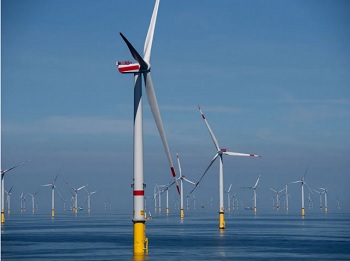
Whale deaths exploited in ‘cynical disinformation’ push against wind power, advocates say
Efforts to stop wind turbines off the Atlantic coast have a new mascot: the whale. A dozen New Jersey beach town mayors and several other groups now argue offshore wind power activity could be the cause of recent whale deaths and wind projects must be stopped while scientists investigate. But those most vocal about their concern have been silent in recent years as whale strandings surged along the East Coast. Wind energy supporters and whale advocates say these groups and politicians appear to be using whales as pawns. >click to read< 10:17






